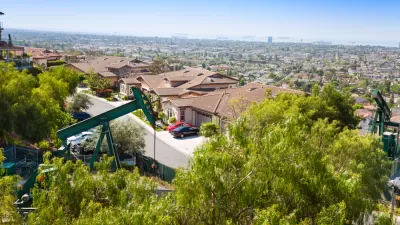The Bureau of Land Management will resume oil and gas leasing in California after a report by a scientific research organization established by the state legislature showed no correlation between fracking and groundwater pollution.
"The study was conducted by the California Council on Science and Technology, a nonpartisan scientific research organization established by the state Legislature [in 1988] to advise state officials," writes Julie Cart, environmental reporter for the Los Angeles Times. Based on the report's findings released Thursday (August 28) "that found little scientific evidence that fracking and similar extraction techniques are dangerous, the federal government will resume oil and gas leasing in California."
The Bureau of Land Management (BLM) commissioned the study, "Well Stimulation in California," after it lost a lawsuit in April, 2013 brought by fracking opponents Center for Biological Diversity and the Sierra Club who argued that additional environmental review was needed before BLM could auction rights for drilling in the Monterey Shale formation.
However, Cart writes that the "authors noted that they had little time and scant information on which to base conclusions, citing widespread 'data gaps' and inadequate scientific resources for a more thorough study."
That was the main point that David R. Baker, energy and clean tech reporter for the San Francisco Chronicle, emphasized in his piece. "There are no recorded cases of that happening in California, the authors note, but it remains a possibility needing further study," he writes.
The report will provide guidance for safe drilling operations, said Jim Kenna, the bureau's California state director. The report delves into issues ranging from the amount of water used by fracking in California - an amount significantly smaller than in other states - to the possibility that disposing of fracking waste water deep underground could trigger earthquakes.
FULL STORY: Fracking report clears way for California oil, gas leasing to resume

Alabama: Trump Terminates Settlements for Black Communities Harmed By Raw Sewage
Trump deemed the landmark civil rights agreement “illegal DEI and environmental justice policy.”

Study: Maui’s Plan to Convert Vacation Rentals to Long-Term Housing Could Cause Nearly $1 Billion Economic Loss
The plan would reduce visitor accommodation by 25% resulting in 1,900 jobs lost.

Why Should We Subsidize Public Transportation?
Many public transit agencies face financial stress due to rising costs, declining fare revenue, and declining subsidies. Transit advocates must provide a strong business case for increasing public transit funding.

Paris Bike Boom Leads to Steep Drop in Air Pollution
The French city’s air quality has improved dramatically in the past 20 years, coinciding with a growth in cycling.

Why Housing Costs More to Build in California Than in Texas
Hard costs like labor and materials combined with ‘soft’ costs such as permitting make building in the San Francisco Bay Area almost three times as costly as in Texas cities.

San Diego County Sees a Rise in Urban Coyotes
San Diego County experiences a rise in urban coyotes, as sightings become prevalent throughout its urban neighbourhoods and surrounding areas.
Urban Design for Planners 1: Software Tools
This six-course series explores essential urban design concepts using open source software and equips planners with the tools they need to participate fully in the urban design process.
Planning for Universal Design
Learn the tools for implementing Universal Design in planning regulations.
Smith Gee Studio
Alamo Area Metropolitan Planning Organization
City of Santa Clarita
Institute for Housing and Urban Development Studies (IHS)
City of Grandview
Harvard GSD Executive Education
Toledo-Lucas County Plan Commissions
Salt Lake City
NYU Wagner Graduate School of Public Service



























